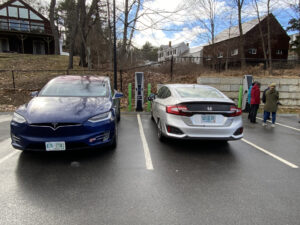By Bruce Tucker, member of the Monadnock Sustainability Hub, Peterborough Community Power Committee and Peterborough Energy Committee Originally published in the Monadnock Shopper News, Green Monadnock column February 1-7, 2023
The state of New Hampshire has a problem when it comes to supporting the expansion of its electric vehicle (EV) charging infrastructure. The focus has been on building out Level 3 DC Fast Chargers (DCFC) along the major travel corridors. But lower power charging using regular outlets (Level 1) or 240 V charging in your garage or a public parking lot (Level 2) has been virtually ignored. Yet since New Hampshire is primarily a rural state, there is greater need for the smaller, affordable, distributed charging that Level 2 chargers provide. As towns, small businesses, and multifamily dwellings consider adding EV charging for their residents, customers, and employees, they soon discover a problem. EV charging stations are just too expensive to operate on the current commercial electric rate plans that apply to them.
Commercial electric rates often include a fee for “Demand” that residential rates don’t have. Demand fees are Kryptonite to EV charging, as Derry found when it was forced to pull the plug on its new EV charging station in 2021. The addition of demand fees is a really big financial burden that continues to discourage the installation of EV charging stations and hinders the adoption of electric vehicles in New Hampshire.
So what are demand fees? “Demand” is the power (measured in kW “kiloWatts”) determining the rate that electricity is pulled from the grid. The electric meter used for commercial customers records the highest sustained demand during the month, which is then added to the other fees for delivering the electricity itself. Utilities structure their demand fees differently, but Eversource, the primary electric utility in the Monadnock region, charges about $20 per kW after the first 5 kW. How much charging can be done with that “free” 5 kW? Not enough. A Level 2 charger operating at its lowest power level squeaks by at 4.8 kW. Compare that to the same charger mounted in the garage of a residential customer that could be delivering 11.5 kW of power without Kryptonite (or Level 3 chargers at 75-250 kW).
Yet operate that same Level 2 charger at 11.5 kW at a public charging station and it would incur 6.5 kW of demand fees – $130. Add three more chargers for a typical small charging station and the three extra chargers incur an additional $630 in demand fees. What town, small business or multifamily unit owner can justify adding almost $800 in monthly demand fees on top of the cost of electricity?
Fortunately, Peterborough became aware of this Kryptonite effect when planning its new EV charging station. By lowering the operating power to a modest 7.2 kW and placing each charger on its own meter, Peterborough essentially “buys” $300 worth of demand for the cost of three additional meter charges. Peterborough’s successful charging station is regularly used, and occasionally all four chargers are occupied.
There is another problem with the Kryptonite included in commercial rates: inequity. Since the public areas of multifamily units and condos must use commercial electric rates, residents are forced to pay more for charging their EV. If we want to encourage EV adoption, everyone must be treated fairly. At a time when housing prices are so high that our young workers cannot afford to buy a garage, let alone a house, the lack of available charging keeps them on the EV sidelines.
Recognizing the need for more EV charging to service the growing adoption of electric vehicles, Lebanon just approved a measure to require EV charging infrastructure in new developments, including apartments and condos. In fact, any developer proposing a new project anywhere should look to the future and see the economic advantage of adding EV charging during the initial construction rather than needing to add it later. It is essential that such efforts are accompanied by rate reform.
Compared to other states, New Hampshire lags far behind in adding EV charging, creating a charging desert that will discourage tourists from visiting and send our workers to live elsewhere. Fortunately, there is current legislation pending that addresses this issue. SB52, currently in the transportation committee, is supported by a variety of organizations including the business and the tourism industries. Hopefully, our legislature, the Public Utility Commission and Eversource are listening.
Bruce Tucker, is a long time EV advocate and has owned EVs continuously since 2003. His 2002 Toyota RAV4EV was a daily driver from 2005-2018. He is a member of the Monadnock Sustainability Hub, Peterborough Community Power Committee and Peterborough Energy Committee.

